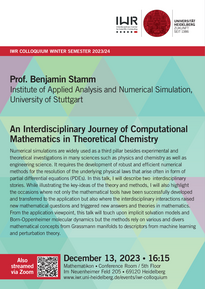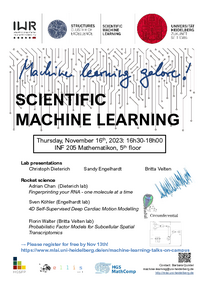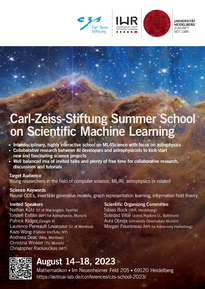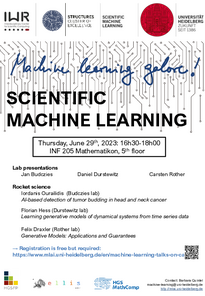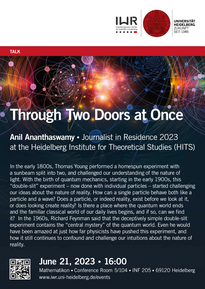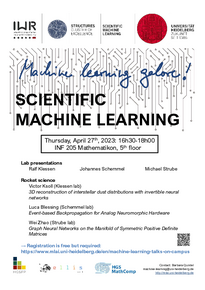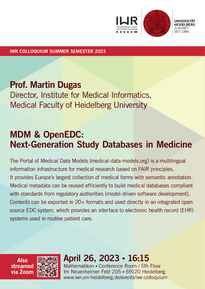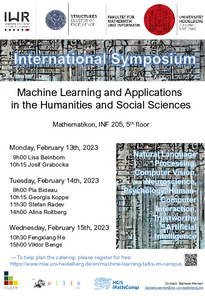
Events 2023
The Interdisciplinary Center for Scientific Computing (IWR) and its affiliated institutions organize a large number of workshops, conferences and other events for discussing latest scientific results as well as identifing upcoming challenges in the field of Scientific Computing. In addition the IWR regularly hosts events which emphasis on broadening and improving the interdisciplinary dialogue.
[January] [February] [March] [April] [May] [June] [July] [August] [September] [October] [November] [December]
December
IWR Colloquium Winter Semester 2023 / 2024
"An Interdisciplinary Journey of Computational Mathematics in Theoretical Chemistry"
Prof. Benjamin Stamm • Institute of Applied Analysis and Numerical Simulation, University of Stuttgart
December 13, 2023 • 16:15
Numerical simulations are widely used as a third pillar besides experimental and theoretical investigations in many sciences such as physics and chemistry as well as engineering science. It requires the development of robust and efficient numerical methods for the resolution of the underlying physical laws that arise often in form of partial differential equations (PDEs). In this talk, I will describe two interdisciplinary stories. While illustrating the key-ideas of the theory and methods, I will also highlight the occasions where not only the mathematical tools have been successfully developed and transferred to the application but also where the interdisciplinary interactions raised new mathematical questions and triggered new answers and theories in mathematics. From the application viewpoint, this talk will touch upon implicit solvation models and Born-Oppenheimer molecular dynamics but the methods rely on various and divers mathematical concepts from Grassmann manifolds to descriptors from machine learning and perturbation theory.
The IWR Colloquium will be held as an in-person event at the Mathematikon. In addition it will be streamed via Zoom. For more information please visit the website of the colloquium.
Location: Mathematikon • Conference Room, Room 5/104, 5th Floor • Im Neuenheimer Feld 205 • 69120 Heidelberg
November

"Frauenpower in Tech: Panel und Networking"
28. November 2023 • 18:00 - 21:00 Uhr
Ist die IT-Welt ein integraler Bestandteil deines Alltags? Hast du den Wunsch, die digitale Zukunft aktiv mitzugestalten und suchst nach Inspiration? Lerne beeindruckende Frauen kennen, die aus unterschiedlichsten Bereichen in die IT eingestiegen sind und dort spannende Projekte machen. Lass Dich durch ihre Geschichten, Herausforderungen und Erfahrungen inspirieren und dir helfen, den richtigen Weg für dich zu finden! Dafür gibt es nach dem Panel noch ein informelles Networking bei kleinen Snacks.
Moderation:
Prof. Dr. Barbara Paech, Software Engineering, Universität Heidelberg
SprecherInnen:
Quereinstieg
- Kerstin Lambert, Digitalisierungsmanagerin, EPPLE GmbH
- Eda Özsahin, IT-Projektkeiterin
- Claire Zschiesche, Ausbildungsleitung Informatik, SAP SE (Panel)
- Sibylle Hofmeyer, PR-Beraterin, Hofmeyer PR
MINT-Studium, IT-Firma
- Dr. Hannah Abelein, Senior Manager, mm1 Consulting GmbH
- Franziska Bierer, Vorstand, andrena objects ag (Panel)
- Elisabeth Kohm, Leiterin Qualitätsmanagement und Qualitätssicherung, Datenschutzbeauftragte, HMS Analytical Software GmbH
- Kristin Sunnick, Softwareentwicklerin, andrena objects ag
Lehramt
- Lisa Galvagno, Studienrätin und Studierende im Erweiterungsfachmaster Informatik (Geographie, Politik, Wirtschaft, Informatik) (Panel)
- Dr. Elisabeth Kraus, Geschwister-Scholl-Gymnasium, Mannheim
- Prof. Dr. Claudia Hildebrandt, CZS Stiftungsprofessur für Informatik und ihre Didaktik, Pädagogische Hochschule Heidelberg, Heidelberg School of Education
Firmengründung
- Ines Korkowski, Gründerin und Geschäftsführerin KRAFTSTOFF Fashion GmbH (Panel)
- Dr. Monika Pobiruchin, Hochschule Heilbronn und Colorful Bytes UG
Wissenschaft
- Dr. Anne Hess, Expert Cross-Disciplinary Requirements Engineering, Fraunhofer Institut für experimentelles Software Engineering, Kaiserslautern (Panel)
- Prof. Dr. Timea Illes-Seifert, Intelligente Systeme, Wissensmanagemnet und Strukturwandel, Technische Hochschule Aschaffenburg
- Dr. Elisabeth Peinsipp-Byma, Abteilungsleiterin am Fraunhofer-Institut für Optronik, Systemtechnik und Bildauswertung, Karlsruhe
Es laden ein: heiInnovation, Institut für Informatik, IWR, GI Fachgruppe Frauen und Informatik
Registriere Dich kostenlos und sei dabei!
Ort: Heidelberg Center for American Studies • Atrium • Hauptstrasse 120 • 69117 Heidelberg
"Machine learning galore!"
November 16, 2023 • 16:30 - 18:00
Machine learning galore will feature lab presentations by PIs as well as scientific talks by junior scientists.
- Lab presentations:
- Christoph Dieterich, Sandy Engelhardt, Britta Velten
- Science talks:
- Adrian Chan (Dieterich lab): Fingerprinting your RNA - one molecule at a time
- Sven Köhler (Engelhardt lab): 4D Self-Supervised Deep Cardiac Motion Modelling
- Florin Walter (Britta Velten lab): Probabilistic Factor Models for Subcellular Spatial Transcriptomics
To help plan the catering, please register for free by clicking here. (Deadline: November 13, 2023)
Scientific Machine Learning is a joint initiative from STRUCTURES and IWR aimed at fostering interactions within and development of the local machine learning community. Its portal, http://mlai.uni-heidelberg.de summarizes the many relevant events and news from across campus that would otherwise remain scattered across single institutions or fields.
The goals of the MLAI platform align with the STRUCTURES Cluster of Excellence's objective of driving research into the fundamental understanding of current and future machine learning, and with IWR’s aim to leverage machine learning to enable the solution of long-standing problems in the natural and life sciences, the engineering sciences, as well as the humanities.
Further information and links:
- MLAI homepage
- Machine Learning Talks on Campus – Information service and mailing list
- STRUCTURES Cluster of Excellence
Location: Mathematikon • Conference Room, Room 5/104, 5th Floor • Im Neuenheimer Feld 205 • 69120 Heidelberg
85. Heidelberger Bildverarbeitungsforum
"Röntgenblick ins Innere: Dynamische Volumenbildaufnahme und -verarbeitung"
7. November 2023 • Fraunhofer-Institut für Techno- und Wirtschaftsmathematik ITWM, Fraunhofer-Platz 1, 67663 Kaiserslautern
In der Bildverarbeitung ist die Volumenbildaufnahme und -verarbeitung in der Praxis angekommen und erschließt immer mehr Anwendungsbereiche außerhalb des klassischen Bereichs der Medizintechnik. An der Speerspitze der Entwicklung steht die dynamische Untersuchung (3D + Zeit) großer Bauteile.
Das 85. Heidelberger Bildverarbeitungsforum bietet eine einmalige Möglichkeit: Einblick in die Technik und Anwendungsmöglichkeiten des kürzlich fertiggestellten Groß-CTs Gulliver am Fachbereich Bauingenieurwesen der Universität Kaiserslautern. Ergänzt wird der Einblick in die Technik mit einem Vortrag über ein Synchroton-CT am ESRF in Grenoble. Die weiteren Vorträge behandeln auf einander abgestimmt wesentliche Methoden zur Bildverarbeitung und Analyse von 3D+ Daten, wie Rissdetektion, Erkennung von Schäden mittels Bildfolgenanalyse (optischer Fluss), Datenkompression der riesigen Datensätze und das Zusammenwirken von Datenaufnahme und Simulation.
Für dieses Thema konnte als kompetenter und lokaler Gastgeber das Fraunhofer ITWM in Kaiserslautern gewinnen. Die in der Mittags- und Kaffeepause stattfindende begleitende Ausstellung zu dem Thema bietet vielfältige Informations- und Gesprächsmöglichkeiten.
Anmeldung und weiterführende Informationen finden sich auf der Webseite der Veranstaltung:
https://www.bv-forum.de/85-bildverarbeitungsforum.html
September
Hacktoberfest 2023: Ignite Your Code!
September 29, 2023 • 16:00
Organizers: Scientific Software Center (SSC), Heidelberg Graduate School of Mathematical and Computational Methods for the Sciences (HGS MathComp), Interdisciplinary Center for Scientific Computing (IWR)
Join us for an electrifying Hacktoberfest experience that's all about code, collaboration, and celebration! On September 29th, gear up to immerse yourself in the heart of the open source movement as we code, connect, and make a difference together.
- Planting Seeds of Change: Your code counts for more than lines – it means trees planted! Every participant contributes to a greener future as the sponsors of Hacktoberfest plant a tree for every successful participant.
- Unveil Digital Treasures: Code your way to a digital reward kit packed with exclusive goodies.
- Master git: New to git? No sweat! Our workshops have you covered to get you up to speed for collaborative coding.
- Savor the Moment: Delight in a feast of knowledge and network over catering.
- Keynote Talk: Gain fresh perspectives from our engaging keynote talk – an eye-opening dive into the world of open source.
- BYOL: Bring Your Own Laptop and let's code up a storm!
! Registration required !
For more information please visit the website of the event: www.iwr.uni-heidelberg.de/events/hacktoberfest-2023
Location: 5th Floor • Mathematikon, Im Neuenheimer Feld 205, 69120 Heidelberg
European Conference on Computational Optimization (EUCCO) 2023
September 25-27, 2023
Local Organizers: Roland Herzog, Evelyn Herberg, Georg Müller, Jeannette Walsch • IWR
The EUCCO conference series aims to bring scientists from computational optimization, algorithms for large-scale optimization problems and related applications together. This 2023 edition will especially emphasize optimization with partial differential equations, large-scale optimization as well as numerical optimization algorithms and software. Previous editions of the EUCCO conference were held in Dresden (2004), Montpellier (2007), Chemnitz (2013), Leuven (2016) and Trier (2018).
For more information please visit the website of the conference: https://scoop.iwr.uni-heidelberg.de/events/2023_eucco/
Location: Heidelberg University
German Conference on Pattern Recognition (DAGM-GCPR)
September 19-22, 2023
Local Organizers: Carsten Rother, Ullrich Köthe • IWR
The German Conference on Pattern Recognition (GCPR) is the annual symposium of the German Association for Pattern Recognition (DAGM). It is the national venue for recent advances in image processing, machine learning, pattern recognition, and computer vision and it follows the long tradition of the DAGM conference series. This year it will celebrate its 45th anniversary in Heidelberg. Alongside the main conference, there will be a small industry fair with free access.
For more information please visit the website of the conference: https://www.dagm-gcpr.de/year/2023
Location: Heidelberg University (IWR, KIP)
Workshop
"How to protect software-based innovation with patents: Already any missed opportunity? - Follow-up workshop"
September 19, 2023
Organizers: ScienceValue Heidelberg • HGS MathComp • IWR • hei_INNOVATION
Registration required! -> Please register via this form
Description:
This course addresses the possibility of patenting software-based innovations in more detail. It is aimed at junior and primarily senior researchers (professors, postdoctoral researchers and PhD candidates).
This seminar is part of the two-session training "How to protect software-based innovation with patents“:
• Introduction - Protecting software-based innovation: September 6, 2023 • 10:00–12:00
• Already any missed opportunity? - Follow-up workshop: September 19, 2023 • 10:00–13:00
In the first session, examples will be used to illustrate the strategic relevance of patents in the field of software for academic institutions and to explain the requirements for software-based innovation to be considered as patentable software inventions. In the second session, participants are invited to provide examples from their own already-disclosed work. These will be discussed and analyzed with regard to the patentability requirements. Personal meetings to discuss not-yet-disclosed innovations can be scheduled after the workshop.
Speaker and moderator: Peter Bittner
Peter Bittner is European patent attorney with 15 years of experience in the filing and prosecution of patents disclosing software-based inventions. Prior to founding the patent law firm PATIT – PATents for IT, Mr. Bittner was responsible for the global patent portfolio management of the research organization of Germany’s largest software provider.
Abstract:
This second seminar is planned as follow-up session to the Introduction seminar for those researchers who would like to review their own work in terms of potential patent protection. For that purpose, participants of the Introduction seminar will be asked to provide a short summary of their own already-disclosed innovations. Three to four selected cases will be analyzed and discussed with all participants with regard to the patentability requirements.
Concerning the patentability of not-yet-disclosed innovations, at the end of the workshop there will be the possibility to plan specific one-to-one meetings to avoid compromising the novelty of the underlying subject matter.
Location: Mathematikon • Conference Room, Room 5/104, 5th Floor • Im Neuenheimer Feld 205 • 69120 Heidelberg
Workshop
"How to protect software-based innovation with patents: Introduction - Protecting software-based innovation"
September 6, 2023
Organizers: ScienceValue Heidelberg • HGS MathComp • IWR • hei_INNOVATION
Registration required! -> Please register via this form
Description:
This course addresses the possibility of patenting software-based innovations in more detail. It is aimed at junior and primarily senior researchers (professors, postdoctoral researchers and PhD candidates).
This seminar is part of the two-session training "How to protect software-based innovation with patents“:
• Introduction - Protecting software-based innovation: September 6, 2023 • 10:00–12:00
• Already any missed opportunity? - Follow-up workshop: September 19, 2023 • 10:00–13:00
In the first session, examples will be used to illustrate the strategic relevance of patents in the field of software for academic institutions and to explain the requirements for software-based innovation to be considered as patentable software inventions. In the second session, participants are invited to provide examples from their own already-disclosed work. These will be discussed and analyzed with regard to the patentability requirements. Personal meetings to discuss not-yet-disclosed innovations can be scheduled after the workshop.
Speaker and moderator: Peter Bittner
Peter Bittner is European patent attorney with 15 years of experience in the filing and prosecution of patents disclosing software-based inventions. Prior to founding the patent law firm PATIT – PATents for IT, Mr. Bittner was responsible for the global patent portfolio management of the research organization of Germany’s largest software provider.
Abstract:
This seminar illustrates the strategic relevance of patents in the field of software for academic institutions and explains the requirements for software-based innovation to be considered as patentable software inventions. In particular, a series of examples will demonstrate opportunities and pitfalls when protecting software-based innovation by means of patent applications. One goal of the seminar is to provide researchers with a tool which they can use for assessing their own research results with regard to the potential that the underlying innovation can be protected via a patent.
Location: Mathematikon • Conference Room, Room 5/104, 5th Floor • Im Neuenheimer Feld 205 • 69120 Heidelberg
August
"Carl-Zeiss-Stiftung Summer School on Scientific Machine Learning"
August 14–18, 2023
- Interdisciplinary, highly interactive school on ML4Science with focus on astrophysics
- Collaborative research between AI developers and astrophysicists to kick-start new and fascinating science projects
- Well balanced mix of invited talks and plenty of free time for collaborative research, discussions and tutorials
Target Audience
Young researchers in the field of computer science, ML/AI, astrophysics or related
Science Keywords
Neural ODEs, invertible generative models, graph representation learning, information field theory
Invited Speakers
Nathan Kutz (U. of Washington, Seattle)
Torsten Enßlin (MPI for Astrophysics, Munich)
Patrick Kidger (Google X)
Laurence Perreault Levasseur (U. of Montreal)
Kaze Wong (Flatiron Institute, NY)
Andreea Deac (Mila, Montreal)
Christina Winkler (TU Munich)
Christopher Rackauckas (MIT)
Scientific Organizing Committee
Tobias Buck (IWR, Heidelberg)
Soledad Villar (Johns Hopkins U., Baltimore)
Aura Obreja (University Observatory Munich)
Morgan Fouesneau (MPI for Astronomy Heidelberg)
! APPLY ONLINE!
For more information please visit the website of the event: https://astroai-lab.de/conferences/czs-school-2023/
Location: Mathematikon • Im Neuenheimer Feld 205 • 69120 Heidelberg
Summer School
"Nature-based Solutions for Tackling Global Health Challenges"
August 7–11, 2023
Exploring win-win Nature-based Solutions (NbS) to tackle pressing global health challenges: climate change and pandemics
An interdisciplinary summer school to equip early-career scientists and practitioners with the main concepts and methods of researching and implementing NbS, including: theory, study design, data and modelling, financing, determining value and implementation as well as their application to the converging global challenges: climate change and pandemics.
Overview
In the 21st century, society faces multiple and highly interwoven global health challenges, linked to accelerating climate change, antimicrobial resistance, food and water insecurity, and an increasing number of infectious diseases. Threatening convergence, these health issues call for more effective and sustainable solutions to ensure that the global population continues to thrive. Scientists and researchers can massively contribute to discovering, co-designing, and evaluating these solutions.
In this context, Nature-based Solutions (NbS), while not yet commonplace, are increasingly gaining recognition alongside more conventional engineering solutions and healthcare interventions. The concept of NbS describes the innovative use of existing knowledge about natural systems to assist society in effectively addressing contemporary environmental, social and economic challenges while simultaneously providing ecological and health benefits. These win-win NbS include the management, restoration and protection of ecosystems, strategies for climate adaptation and mitigation and the greening of infrastructure.
The Summer School will explore the innovative potential of NbS to tackle two pressing global health challenges – climate change and pandemic prevention, which are highly interconnected and provide opportunities to design, apply and evaluate a range of win-win NbS to inform future policies based on scientific evidence.
The guest speakers will share their expertise and experience with the participants and will collaboratively work together on a capstone project, relevant to the development and presentation of a research project on NbS to tackle climate change and pandemics.The Summer School will promote interdisciplinary thinking and will encourage participants to bring examples of NbS beyond these two challenges for discussion to consider how to develop NbS that address concrete challenges and implement solutions in very diverse settings. As a result, the Summer School will allow participants to further connect, interact, and build a worthwhile network of expertise on NbS.
Target Audience
MSc. and PhD candidates as well as postdoctoral scientists and young researchers from a broad range of disciplines who have a strong motivation to apply NbS in their field of research or work.
! APPLY ONLINE!
For more information please visit the website of the event:
https://csidlab.iwr.uni-heidelberg.de/summer-school-2023-nature-based-solutions.html
Location: Mathematikon • Im Neuenheimer Feld 205 • 69120 Heidelberg
July
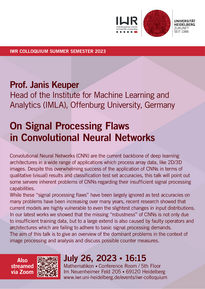
IWR Colloquium Summer Semester 2023
"On Signal Processing Flaws in Convolutional Neural Networks"
Prof. Janis Keuper • Head of the Institute for Machine Learning and Analytics (IMLA), Offenburg University, Germany
July 26, 2023 • 16:15
Convolutional Neural Networks (CNN) are the current backbone of deep learning architectures in a wide range of applications which process array data, like 2D/3D images. Despite this overwhelming success of the application of CNNs in terms of qualitative (visual) results and classification test set accuracies, this talk will point out some servere inherent problems of CNNs regarding their insufficient signal processing capabilities.
While these “signal processing flaws” have been largely ignored as test accuracies on many problems have been increasing over many years, recent research showed that current models are highly vulnerable to even the slightest changes in input distributions. In our latest works [1-5], we showed that the missing “robustness” of CNNs is not only due to insufficient training data, but to a large extend is also caused by faulty operators and architectures which are failing to adhere to basic signal processing demands. The aim of this talk is to give an overview of the dominant problems in the context of image processing and analysis and discuss possible counter measures.
References:
[1] Durall, R., Keuper, M., & Keuper, J. (2020). Watch your up-convolution: Cnn based generative deep neural networks are failing to reproduce spectral distributions. CVPR 2020
[2] Grabinski, J., Keuper, J., & Keuper, M. (2022). Aliasing and adversarial robust generalization of CNNs. Machine Learning, 111(11), 3925-3951.
[3] Grabinski, J., Jung, S., Keuper, J., & Keuper, M. (2022). FrequencyLowCut Pooling--Plug & Play against Catastrophic Overfitting. ECCV 2022
[4] Grabinski, J., Gavrikov, P., Keuper, J., & Keuper, M. Robust Models are less Over-Confident. NeurIPS 2022
[5] Gavrikov, P., & Keuper, J. (2022). CNN Filter DB: An Empirical Investigation of Trained Convolutional Filters. CVPR 2022 (oral)
The IWR Colloquium will be held as an in-person event at the Mathematikon. In addition it will be streamed via Zoom. For more information please visit the website of the colloquium.
Location: Mathematikon • Conference Room, Room 5/104, 5th Floor • Im Neuenheimer Feld 205 • 69120 Heidelberg
Talk: "The National High-Performance Computing Alliance and NHR@FAU: New Structures and Opportunities"
Prof. Gerhard Wellein • Erlangen National High Performance Computing Center, Friedrich-Alexander-Universität Erlangen-Nürnberg, Germany
July 18, 2023 • 13:00-14:30
In 2021 a long-term HPC infrastructure (“Nationales Hochleistungsrechnen”; NHR) has been established to further develop HPC capabilities, HPC expertise and training offerings at German universities. Nine NHR centers are now offering their compute services, support activities and training free of charge to researchers at all German universities. These centers coordinate their investments as well as application and support profiles within the NHR-Verein.
The presentation will introduce the structure of the NHR program, central NHR activities of the NHR-Verein and the structure of the application process. It will specially report on offerings and developments at the NHR center at Friedrich-Alexander-Universität Erlangen-Nürnberg (NHR@RFAU) which focuses on atomistic applications and node-level performance engineering.
This talk is organized by the Scientific Software Center (SSC).
Location: Mathematikon • Lecture Hall, Ground Floor • Im Neuenheimer Feld 205 • 69120 Heidelberg
MCTDH Summer School 2023
July 13-17, 2023
Organizers:
Prof. Fabien Gatti • CNRS, University Paris Saclay, France
Prof. Oriol Vendrell • Institute of Physical Chemistry & IWR, Heidelberg University
The MCTDH Summer School offers an intensive training program designed to provide participants with hands-on experience using the Heidelberg MCTDH software package, as well as theoretical background on the underlying principles and methods. It also provides training in the theory and application of the MCTDH-X package for identical particles, as well as a session devoted to the connections of MCTDH with related approaches such as DMRG and methods based on tree-tensor networks.
The program targets mainly PhD students, early-stage researchers, and aims at providing them with sufficient proficiency to afterward apply the MCTDH method in their day-to-day research activities.
The school spreads over five days with theory sessions in the morning and hands-on exercises in the afternoon. The list of topics covered includes:
- Numerical methods for quantum dynamics
- MCTDH theory
- Hands-on exercises with the Heidelberg MCTDH package
- Introduction to polyspherical coordinates
- Mode combinations and multilayer tree generation
- Potential energy operators in sum-of-products form
- MCTDH for bosons and fermions (MCTDH-X)
- Density matrix renormalization group (DMRG) through the lens of MCTDH
- DMRG in electronic and vibrational problems
We can accept only a limited number of participants. For admittance, please follow the instructions on how to apply:
https://www.mctdh-school.uni-heidelberg.de/apply.html
The deadline for applications is May 14, 2023.
Location: International Academic Forum Heidelberg (IWH)
June
"Machine learning galore!"
June 29, 2023 • 16:30 - 18:00
Machine learning galore will feature lab presentations by PIs as well as scientific talks by junior scientists.
- Lab presentations:
- Jan Budczies, Daniel Durstewitz, Carsten Rother
- Science talks:
- Iordanis Ourailidis (Budczies lab): AI-based detection of tumor budding in head and neck cancer
- Florian Hess (Durstewitz lab): Learning generative models of dynamical systems from time series data
- Felix Draxler (Rother lab): Generative Models - Applications and Guarantees
To help plan the catering, please register for free by clicking here.
Scientific Machine Learning is a joint initiative from STRUCTURES and IWR aimed at fostering interactions within and development of the local machine learning community. Its portal, http://mlai.uni-heidelberg.de summarizes the many relevant events and news from across campus that would otherwise remain scattered across single institutions or fields.
The goals of the MLAI platform align with the STRUCTURES Cluster of Excellence's objective of driving research into the fundamental understanding of current and future machine learning, and with IWR’s aim to leverage machine learning to enable the solution of long-standing problems in the natural and life sciences, the engineering sciences, as well as the humanities.
Further information and links:
- MLAI homepage
- Machine Learning Talks on Campus – Information service and mailing list
- STRUCTURES Cluster of Excellence
Location: Mathematikon • Conference Room, Room 5/104, 5th Floor • Im Neuenheimer Feld 205 • 69120 Heidelberg
16th Informatics for Life Lecture Series
"Challenges in Solving Large scale PDE-constrained Optimization"
Nagaiah Chamakuri • IISER, Thiruvananthapuram, India
July 27, 2023 • 18:00
This talk presents a feasible study of optimal control techniques for cardiac defibrillation based on the bidomain-bath equations posed on a rabbit ventricle geometry. The bidomain model consists of a system of elliptic partial differential equations coupled with a non-linear parabolic equation of reaction-diffusion type, where a set of ordinary differential equations describes the reaction term, modeling ionic transport. Since ODEs describe the ionic currents in the tissue, the PDE part dominates the solving effort. Thus, it is unclear if commonly used splitting methods can outperform a coupled approach by maintaining good accuracy. The results will be presented in the first part based on comparing the coupled solver approach with commonly used splitting schemes to solve more sophisticated physiological models. Consequently, the novel memory-efficient computational technique will be demonstrated to solve the coupled systems of equations. In the second part, the optimal control approach for successful cardiac defibrillation will be shown based on minimizing a properly chosen cost functional depending on the extracellular current as input at the boundary of the bidomain-bath domain.
Biosketch:
Nagaiah Chamakuri got his M.Tech at IIT Madras, India, in 2002 and obtained his Ph.D. from Otto-von-Guericke University in 2007. After that, he worked as a Postdoc at several places in Austria and Germany. He worked as an Associate Professor at Mahindra-Ecole Centrale, Hyderabad from 2016-2019. Since 2020, he has been working as a faculty at the Indian Institute of Science Education and Research (IISER), Thiruvananthapuram, India. His scientific interests include the numerical solution of partial differential equations, Optimal control of PDEs, applications in fluid flow, Computational biology, and High-performance computing. For more information: https://www.iisertvm.ac.in/faculty/nchamakuri/
Weblink: Informatics for Life
Location: Mathematikon • Seminar Room B, Ground Floor • Im Neuenheimer Feld 205 • 69120 Heidelberg
Talk: "Through Two Doors at Once"
Anil Ananthaswamy • Journalist in Residence 2023 at the Heidelberg Institute for Theoretical Studies (HITS)
June 21, 2023 • 16:00
In the early 1800s, Thomas Young performed a homespun experiment with a sunbeam split into two, and challenged our understanding of the nature of light. With the birth of quantum mechanics, starting in the early 1900s, this "double-slit" experiment—now done with individual particles—started challenging our ideas about the nature of reality. How can a single particle behave both like a particle and a wave? Does a particle, or indeed reality, exist before we look at it, or does looking create reality? Is there a place where the quantum world ends and the familiar classical world of our daily lives begins, and if so, can we find it? In the 1960s, Richard Feynman said that the deceptively simple double-slit experiment contains the "central mystery" of the quantum world. Even he would have been amazed at just how far physicists have pushed this experiment, and how it still continues to confound and challenge our intuitions about the nature of reality.
About the speaker:
Anil Ananthaswamy is an award-winning science journalist and former staff writer and deputy news editor at New Scientist magazine. Currently, as a freelance journalist, he writes for Quanta, Scientific American, New Scientist and Nature, among others. His most recent book, Through Two Doors at Once was named one of Smithsonian's Favorite Books of 2018 and one of Forbes's 2018 Best Books About Astronomy, Physics and Mathematics. In 2023 Anil Ananthaswamy was selected as “Journalist in Residence" at HITS.
Location: Mathematikon • Conference Room, Room 5/104, 5th Floor • Im Neuenheimer Feld 205 • 69120 Heidelberg
May
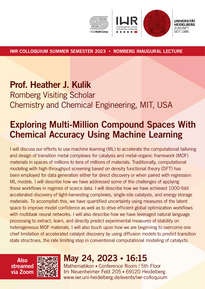
IWR Colloquium Summer Semester 2023 &
HGS MathComp Romberg Inauguration Lecture
"Exploring Multi-Million Compound Spaces With Chemical Accuracy Using Machine Learning"
Romberg Visiting Scholar - Prof. Heather J. Kulik • Chemistry and Chemical Engineering, Massachusetts Institute of Technology, USA
May 24, 2023 • 16:15
I will discuss our efforts to use machine learning (ML) to accelerate the computational tailoring and design of transition metal complexes for catalysis and metal-organic framework (MOF) materials in spaces of millions to tens of millions of materials. Traditionally, computational modeling with high-throughput screening based on density functional theory (DFT) has been employed for data generation either for direct discovery or when paired with regression ML models. I will describe how we have addressed some of the challenges of applying these workflows in regimes of scarce data. I will describe how we have achieved 1000-fold accelerated discovery of light-harvesting complexes, single-site catalysts, and energy storage materials. To accomplish this, we have quantified uncertainty using measures of the latent space to improve model confidence as well as to drive efficient global optimization workflows with multitask neural networks. I will also describe how we have leveraged natural language processing to extract, learn, and directly predict experimental measures of stability on heterogeneous MOF materials. I will also touch upon how we are beginning to overcome one chief limitation of accelerated catalyst discovery by using diffusion models to predict transition state structrues, the rate limiting step in conventional computational modeling of catalysts.
About the HGS MathComp Romberg Program
With its founding in 2007 the HGS MathComp implemented the distinguished Romberg Guest Professorship. With this program the graduate school invites leading researchers working in a field relevant to the graduate school for a longer stay and to participate in the study training program.
The guests invited via the HGS MathComp Romberg Program make substantial contributions to the study program by complementing the teaching done by the members or by disseminating their latest research results at the school.
Link HGS MathComp Romberg Program: www.mathcomp.uni-heidelberg.de/romberg-program
The IWR Colloquium will be held as an in-person event at the Mathematikon. In addition it will be streamed via Zoom. For more information please visit the website of the colloquium.
Location: Mathematikon • Conference Room, Room 5/104, 5th Floor • Im Neuenheimer Feld 205 • 69120 Heidelberg
Öffentlicher Vortrag: "Klimawandel und Infektionskrankheiten in Bezug auf Gesundheitswesen und Mobilität" / Public Lecture "Climate Change and Infectious Diseases"
16. Mai 2023 • 17:00 - 19:00
Die Veranstaltung findet in deutscher und englischer Sprache statt. / The event will be held in German and English.
Sprecher / Speakers:
Prof. Till Bärnighausen • Heidelberg Institute of Global Health (HIGH) & IWR
Dr. Norbert Becker • Centre for Organismal Studies (COS)
Prof. Joacim Rocklöv • IWR & HIGH
Prof. Carsten Wergin • Faculty of Behavioral and Cultural Studies
Prof. Alexander Zipf • Heidelberg Institute for Geoinformation Technology (HeiGIT) & GIScience
Beschreibung:
Pandemien wie COVID und Infektionskrankheiten wie das Dengue-Fieber stellen eine zunehmende Bedrohung für Gemeinschaften in der ganzen Welt dar, was unter anderem auf den Klimawandel und den internationalen Reise- und Handelsverkehr zurückzuführen ist. Es ist wichtiger denn je, dass wir uns als Gesellschaft bemühen, vorausschauende Praktiken und Kapazitäten zu entwickeln, um auf aufkommende Gesundheitsbedrohungen zu reagieren.
Der öffentliche Vortrag informiert durch eine interdisziplinär aufgestellte Expertenrunde über diese Bedrohungen und die Auswirkungen von Mobilität und Umwelt auf Krankheitsüberträger wie Stechmücken. Die Referenten werden über die aktuelle Forschung an der Universität Heidelberg und ihren Partnerinstitutionen sprechen sowie die App ‚Mosquito Alert‘ und das damit verbundene Citizen-Science-Projekt vorstellen.
Mosquito Alert setzt sich europaweit für die Identifizierung und Überwachung sich ausbreitender Mückenpopulationen ein und startet nun eine neue Fallstudie für Heidelberg und den Rhein-Neckar-Raum. Teilnehmende Bürgerinnen und Bürger können Fotos direkt über die App an professionelle Entomologen schicken, um festzustellen, ob sich invasive Mückenpopulationen in ihren Gemeinden ausbreiten.
Description:
The emergence and transmission of pathogens that cause infectious diseases is an increasing threat in Europe, fueled by climate change, globalization, increasing international mobility, amongst many other broad societal and environmental transformations. Since the 2000s, The Upper Rhine Valley in Southwestern Germany has emerged as a hotspot for invasive Asian tiger mosquitoes with their populations persisting despite control and eradication efforts by local and regional administrations.
To address the growing public health risk endemic Asian tiger mosquitoes populations pose in relation to the spread of infectious diseases, it is critical that efforts are undertaken to evaluate the conditions contributing to the establishment of Asian tiger mosquitoes populations as well as how efforts to mitigate and respond to climate change may actually make local environments more suitable to these disease vectors amongst others.
Join professors from Universität Heidelberg to learn about these threats and the impacts of climate change and mobility on disease vectors such as mosquitoes. Speakers will address current research at Universität Heidelberg and its partner institutions as well as the citizen science initiative Mosquito Alert which is working to tackle invasive mosquito populations across the globe.
Veranstaltungsort / Location:
Mathematikon • Hörsaal, Erdgeschoss / Lecture Hall, Ground Floor • Im Neuenheimer Feld 205, 69120 Heidelberg
SIMPLAIX Workshop on "Machine Learning for Multiscale Molecular Modeling"
Rebecca Wade (HITS) • Andreas Dreuw (IWR, Heidelberg University) • Frauke Gräter (HITS) • Fred Hampreccht (IWR, Heidelberg University) • Ganna Gryn'ova (HITS) • Marcus Elstner (KIT) • Pascal Friedrich (KIT) • Ullrich Köthe (IWR, Heidelberg University)
May 2–4, 2023
SIMPLAIX is a cooperation between the Heidelberg Institute for Theoretical Studies (HITS), the Karlsruhe Institute of Technology (KIT) and Heidelberg University, focussed on bridging scales from molecules to molecular materials by multiscale simulation and machine learning (www.simplaix.org). The aim of the workshop is to bring together scientists working in the field to share their research and discuss current challenges.
Registration is now open. Registration deadline: 15 March, 2023.
For more information please visit the website of the workshop: https://simplaix-workshop2023.h-its.org/
Location: Studio Villa Bosch Heidelberg • Schloss-Wolfsbrunnenweg 33 • 69118 Heidelberg
April
"Machine learning galore!"
April 27, 2023 • 16:30 - 18:00
Machine learning galore will feature lab presentations by PIs as well as scientific talks by junior scientists.
- Lab presentations:
- Ralf Klessen, Johannes Schemmel, Michael Strube
- Science talks:
- Victor Ksoll (Klessen lab): 3D reconstruction of interstellar dust distributions with invertible neural networks
- Luca Blessing (Schemmel lab): Event-based Backpropagation for Analog Neuromorphic Hardware
- Wei Zhao (Strube lab): Graph Neural Networks on the Manifold of Symmetric Positive Definite Matrices
To help plan the catering, please register for free by clicking here.
Scientific Machine Learning is a joint initiative from STRUCTURES and IWR aimed at fostering interactions within and development of the local machine learning community. Its portal, http://mlai.uni-heidelberg.de summarizes the many relevant events and news from across campus that would otherwise remain scattered across single institutions or fields.
The goals of the MLAI platform align with the STRUCTURES Cluster of Excellence's objective of driving research into the fundamental understanding of current and future machine learning, and with IWR’s aim to leverage machine learning to enable the solution of long-standing problems in the natural and life sciences, the engineering sciences, as well as the humanities.
Further information and links:
- MLAI homepage
- Machine Learning Talks on Campus – Information service and mailing list
- STRUCTURES Cluster of Excellence
Location: Mathematikon • Conference Room, Room 5/104, 5th Floor • Im Neuenheimer Feld 205 • 69120 Heidelberg
IWR Colloquium Summer Semester 2023
"MDM & OpenEDC: Next-Generation Study Databases in Medicine"
Prof. Martin Dugas • Director, Institute for Medical Informatics, Medical Faculty of Heidelberg University
April 26, 2023 • 16:15
The Portal of Medical Data Models (medical-data-models.org) is a multilingual information infrastructure for medical research based on FAIR principles. It provides Europe’s largest collection of medical forms with semantic annotation. Medical metadata can be reused efficiently to build medical databases compliant with standards from regulatory authorities (model-driven software development). Contents can be exported in 20+ formats and used directly in an integrated open source EDC system, which provides an interface to electronic health record (EHR) systems used in routine patient care.
The IWR Colloquium will be held as an in-person event at the Mathematikon. In addition it will be streamed via Zoom. For more information please visit the website of the colloquium.
Location: Mathematikon • Conference Room, Room 5/104, 5th Floor • Im Neuenheimer Feld 205 • 69120 Heidelberg
March
83. Heidelberger Bildverarbeitungsforum
"Moderne Optische Komponenten für die Bildverarbeitung"
7. März 2023 • Hochschule Aalen - Technik und Wirtschaft, Beethovenstraße 1, 73430 Aalen
Bei allem Hype über Künstliche Intelligenz wird schnell übersehen, dass auch auf anderen Gebieten der Bildverarbeitung und Bildgewinnung entscheidende Fortschritte erzielt wurden. Dies gilt gerade auch für die optischen Komponenten zur Beleuchtung und Bildaufnahme. Und es gibt jetzt den neuen Open Optics Camera Interface (OOCI) Standard zur Einbindung und Konfiguration optischer Komponenten in Bildverarbeitssystemen, der gerade als einer der 10 Top inVision Innovationen 2023 ausgezeichnet wurde. Damit ist es an der Zeit, einen Überblick über die neuen Möglichkeiten moderner optischer Komponenten für die Bildverarbeitung zu gewinnen.
Für dieses Thema konnte das Heidelberger Bildverarbeitungsforum das Zentrum für Optische Technologien der Hochschule Aalen als kompetenten Mitveranstalter gewinnen. Ein Highlight wird daher auch die Führung durch das Zentrum und die begleitende Ausstellung zu dem Thema sein.
Nach zwei Jahren Heidelberger Bildverarbeitungsforum nur Online können wir uns zum dritten Mal wieder vor Ort treffen, bleibende Eindrücke und umsetzbare neue Erkenntnisse gewinnen gemäß dem Motto des Forums: „Neue Konzepte für die Praxis“.
Anmeldung und weiterführende Informationen finden sich auf der Webseite der Veranstaltung:
https://www.bv-forum.de/83-bildverarbeitungsforum.html
February
"Machine Learning and Applications in the Humanities and Social Sciences "
February 13-15, 2023
Monday • February 13, 2023
09:00 Lisa Beinborn
10:15 Josif Grabocka
Tuesday • February 14, 2023
09:00 Pia Bideau
10:15 Georgia Koppe
11:30 Stefan Radev
14:00 Alina Roitberg
Wednesday • February 15, 2023
10:30 Fengxiang He
15:00 Viktor Bengs
To help plan the catering, please register for free:
https://www.mlai.uni-heidelberg.de/en/machine-learning-talks-on-campus
Location: Mathematikon • Conference Room, Room 5/104, 5th Floor • Im Neuenheimer Feld 205 • 69120 Heidelberg
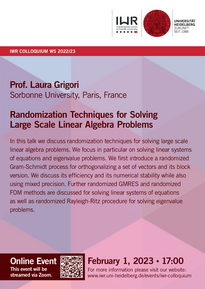
IWR Colloquium Winter Semester 2022 / 2023
ONLINE EVENT: "Randomization techniques for solving large scale linear algebra problems"
Prof. Laura Grigori • Director of Research, INRIA Paris • Alpines group, joint with Laboratoire J.L. Lions, Sorbonne University, Paris, France
February 1, 2023 • 17:00
In this talk we discuss randomization techniques for solving large scale linear algebra problems. We focus in particular on solving linear systems of equations and eigenvalue problems. We first introduce a randomized Gram-Schmidt process for orthogonalizing a set of vectors and its block version. We discuss its efficiency and its numerical stability while also using mixed precision. Further randomized GMRES and randomized FOM methods are discussed for solving linear systems of equations as well as randomized Rayleigh-Ritz procedure for solving eigenvalue problems.
The IWR Colloquium will be streamed via Zoom.
For more information please visit the website of the colloquium.
January
"Applications of AAA Rational Approximation"
Prof. Nick Trefethen • Mathematical Institute, University of Oxford, UK
January 27, 2023 • 15:15
For the first time, a method has recently become available for fast computation of near-best rational approximations on arbitrary sets in the real line or complex plane: the AAA algorithm (Nakatsukasa-Sete-T. 2018). We will present the algorithm and then demonstrate a number of applications, including
- detection of singularities
- model order reduction
- analytic continuation
- interpolation of equispaced data
- smooth extension of multivariate real functions
- extrapolation of ODE and PDE solutions into the complex plane
- solution of Laplace problems
- conformal mapping
- Wiener-Hopf factorization
(joint work with Stefano Costa and others)
Location: Mathematikon • Conference Room, Room 5/104, 5th Floor • Im Neuenheimer Feld 205 • 69120 Heidelberg
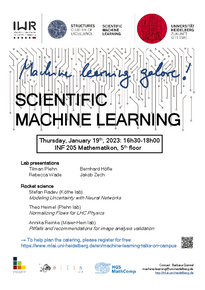
"Machine learning galore!"
January 19, 2023 • 16:30 - 18:00
Machine learning galore will feature lab presentations by PIs as well as scientific talks by junior scientists.
- Lab presentations:
- Tilman Plehn, Rebecca Wade, Bernhard Höfle, Jakob Zech
- Science talks:
- Stefan Radev (Köthe lab): Modeling Uncertainty with Neural Networks
- Theo Heimel (Plehn lab): Normalizing Flows for LHC Physics
- Annika Reinke (Maier-Hein lab): Pitfalls and recommendations for image analysis validation
To help plan the catering, please register for free by clicking here.
Scientific Machine Learning is a joint initiative from STRUCTURES and IWR aimed at fostering interactions within and development of the local machine learning community. Its portal, http://mlai.uni-heidelberg.de summarizes the many relevant events and news from across campus that would otherwise remain scattered across single institutions or fields.
The goals of the MLAI platform align with the STRUCTURES Cluster of Excellence's objective of driving research into the fundamental understanding of current and future machine learning, and with IWR’s aim to leverage machine learning to enable the solution of long-standing problems in the natural and life sciences, the engineering sciences, as well as the humanities.
Further information and links:
- MLAI homepage
- Machine Learning Talks on Campus – Information service and mailing list
- STRUCTURES Cluster of Excellence
Location: Mathematikon • Conference Room, Room 5/104, 5th Floor • Im Neuenheimer Feld 205 • 69120 Heidelberg
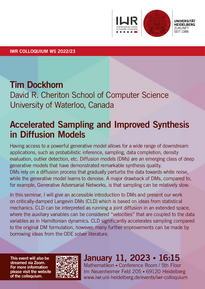
IWR Colloquium Winter Semester 2022 / 2023
"Accelerated Sampling and Improved Synthesis in Diffusion Models"
Tim Dockhorn • David R. Cheriton School of Computer Science • University of Waterloo, Canada
January 11, 2023 • 16:15
Having access to a powerful generative model allows for a wide range of downstream applications, such as probabilistic inference, sampling, data completion, density evaluation, outlier detection, etc. Diffusion models (DMs) are an emerging class of deep generative models that have demonstrated remarkable synthesis quality. DMs rely on a diffusion process that gradually perturbs the data towards white noise, while the generative model learns to denoise. A major drawback of DMs, compared to, for example, Generative Adversarial Networks, is that sampling can be relatively slow.
In this seminar, I will give an accessible introduction to DMs and present our work on critically-damped Langevin DMs (CLD) which is based on ideas from statistical mechanics. CLD can be interpreted as running a joint diffusion in an extended space, where the auxiliary variables can be considered "velocities" that are coupled to the data variables as in Hamiltonian dynamics. CLD significantly accelerates sampling compared to the original DM formulation, however, many further improvements can be made by borrowing ideas from the ODE solver literature.
The IWR Colloquium will be held as an in-person event at the Mathematikon. In addition it will be streamed via Zoom. For more information please visit the website of the colloquium.
Location: Mathematikon • Conference Room, Room 5/104, 5th Floor • Im Neuenheimer Feld 205 • 69120 Heidelberg
